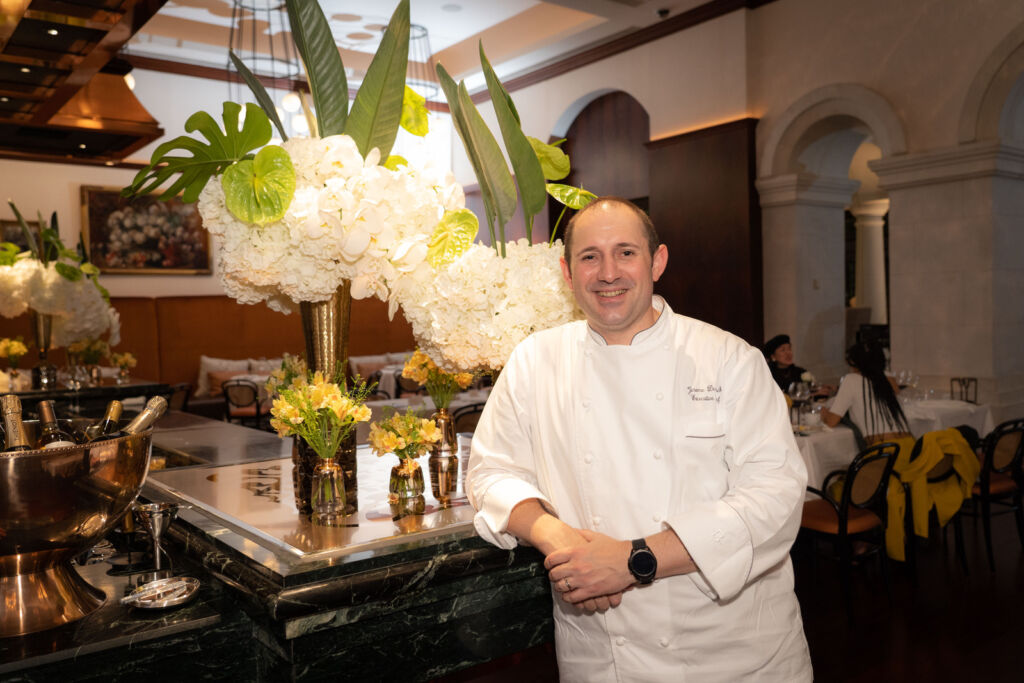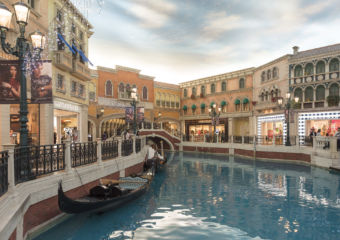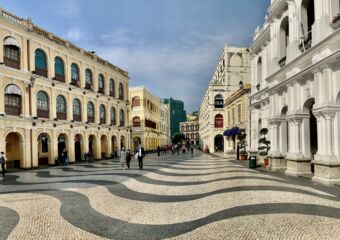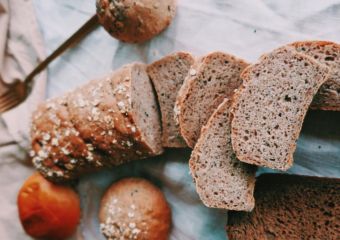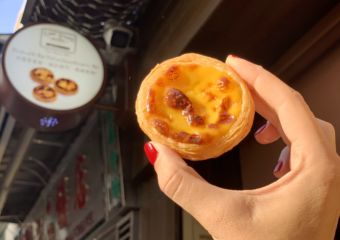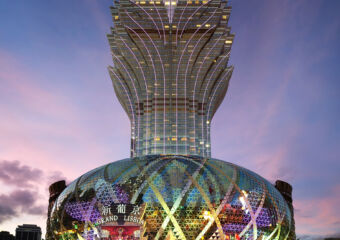Born and bred in the charming alpine town of Annecy, located in southeastern France, Chef Jerome Deconinck was inspired by his father and grandfather to love food and cherish moments around the table as a family. Three decades into his culinary journey, Chef Jerome Deconinck has earned several awards and recognitions and holds an impressive resume that includes working at some of the world’s top kitchens. Despite his great accomplishments, Chef Jerome shows a down-to-earth frame of mind and has a very clear definition of what it takes to make a great chef–rigor, precision, unbounded devotion, and, above all, the love of the craft. Overseeing all kitchen operations at MGM Macau and leading a team of hundreds of people, Chef Jerome welcomed us at the newly-revamped Aux Beaux Arts for a chat on his passionate journey into the culinary universe and told us about what diners are in for at the French brasserie.
Can you tell our readers a bit about your background and how you came to be Chef Jerome Deconinck?
In my case, it wasn’t a grandmother who sparked it, it was a grandfather for a change! (laughs) I come from a family of people who love to eat and in which men have always cooked. My grandfather was a wonderful cook. My father was a tremendous cook as well. They weren’t professional chefs in any way but we always had home-cooked food prepared by them. During the weekends we’d be cooking for the family who’d come to visit us. Also, it was really easy for us to go to farms or the market and get good produce, farm to table. I’d say becoming a chef started with the love of food and mostly with the love of family. I must have been 11 when I cooked the first meal for my parents and grandparents from scratch. I meticulously followed a recipe by Chef Paul Bocuse, step by step, with the assistance of my grandfather since it involved using an oven.
Is there any particular dish your grandfather used to cook for you that you can tell us about?
Oh yes! It’s a simple fish dish. In French, we call it a “colin”, a very basic non-expensive white fish easily available in any Atlantic coastal city, it’s pretty simple. My grandfather used to steam it and pour some melted butter on it. That’s it. The thing is, the fish was freshly caught from the sea and the butter came from the farm next door. It was amazing and I just can’t take it away from my head. It’s that simple yet that good. These experiences highly contributed to me becoming a food lover.
You have worked in Asia for a number of years and for Michelin-starred establishments, how has this influenced you and the food you create today?
Traveling influences tremendously the vision that you have of food and it also influences a lot the understanding of the customer. You can’t cook good food if you don’t understand who you are cooking for. The Michelin background makes you understand the refinement, the technique, and the precision that you need to master to keep cooking good food consistently. Again, and again, and again. From a Michelin standpoint, the level of precision that is required is just outstanding.
Having had the experience of traveling around the world, I’d say it makes you truly understand your customers and their palates. Being in Asia and understanding the customer changes every single belief that you are confident about. The first time I cooked in Asia, we served the food and people went, “I don’t like it”, and there I was thinking the food is good. It’s very humbling because you get rejected often, although fully knowing you are indeed skilled at it. We need to adapt to the palate and the culture. It makes you much more reactive and more easily adaptable to the situation. All the while, of course, keeping your core. You can’t take that away because it drives your creativity and passion. Without it, you just can’t wake up in the morning and go to work. But this goes for whatever field, not just culinary, right?
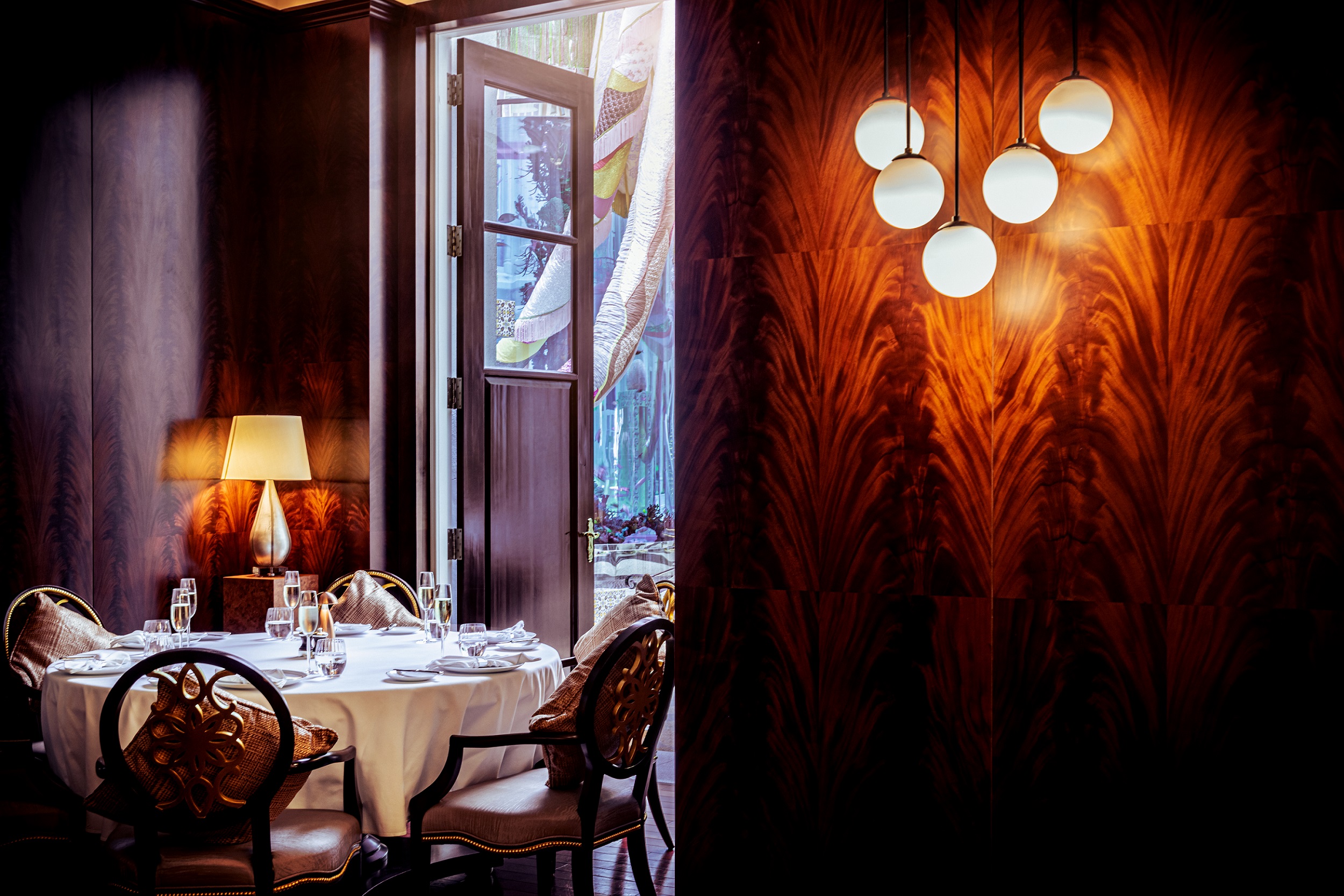
Among several other professional achievements, you were part of the chef’s team for the Department of the French Prime Minister. Can you tell our readers more about that experience? Would you let us know of any renowned personalities you have cooked for before?
I’ve cooked for several renowned personalities. While in Malaysia, I’ve cooked for the King and the Prime Minister as well. However, I can’t tell you about the personalities I’ve cooked for while working for the Department of the French Prime Minister, I can only say that it includes several heads of state and the like–it was pretty common back then.
Were you nervous?
It is always nerve-wracking! I finished my Bachelor’s degree in cooking at a time when every French man was required to do military service. I got high honors distinction in my exam and someone thought I’d be more useful cooking at the service of my country, namely for the Prime Minister. It was an interesting experience. It got quite busy because not only we fed him and his family but all the members of the cabinet as well, on a daily basis and at special parties and events too. We’re talking about a few hundred people a day. During the weekends, when he would move from Paris to the countryside property we’d follow him of course and access was pretty close. I’ve had the French Prime Minister in the morning in his pajamas asking for his breakfast. It is simultaneously a daunting and very simple environment. I did eight months for the cabinet and afterward moved to the French Embassy in Kuala Lumpur. That’s what opened the door to Asia for me. If it hadn’t been for that I’d probably still be in France working for a Michelin star chef because that was my passion when I was a kid.
And how do you feel about Asia?
I love it! I’ve been in Asia now for 20 years and my wife is Thai. I’m pretty much anchored.
You have been in Macau for almost four years now, what brought you to Macau? What were your first impressions of the city?
When you first land in Macau the first thing you see is the lights and the resorts and you are in awe. That is the glamorous side of Macau and that is what made Macau the city it is today. After that, you turn and get to discover the real Macau and that is a very different approach. There is so much history and culture behind it that is sometimes overshadowed by the glitz and glamor. It’s nice to get this kind of European feel in Macau and to feel a little bit at home.
What brought me here first was the challenge of working in a fast-paced environment such as this. There are only a few places in the world that present these kinds of opportunities: these massive resorts and this way of working. I consider myself lucky to be one of the few to be able to lead a team in these conditions. You can lead a hotel anywhere in the world but there are very few places in the world where you can lead properties like this. It is a rare opportunity and that chance is what ultimately brought me to Macau: the resources, the speed, and pace at which we have to develop new ideas, constantly putting ourselves in a position where we need to renew ourselves and re-evaluate what we’re doing because if we don’t move fast enough we lose track, while everybody else is (moving fast). In Macau the strength is renewal. Here, if you don’t renew yourself, you are out.
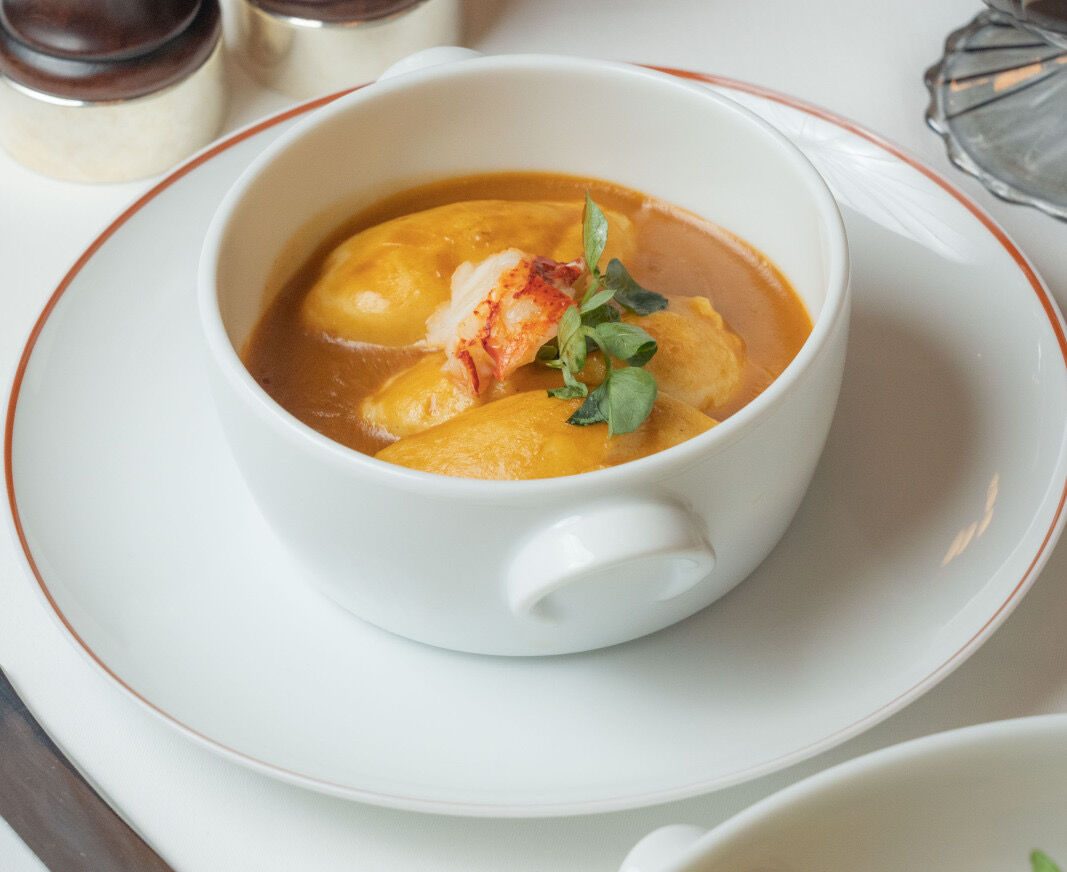
Aux Beaux Arts has just refreshed its menu and interiors, how would you describe the new dining experience? What can guests expect?
A bloody good time! The way the menu has been created and reviewed is the product of a thorough discussion within the team and setting out what Aux Beaux Arts stands for as well as what French food stands for. Aux Beaux Arts was the rendez vous of Macau and we want to make sure it comes back as this, again. A good time in France is always surrounded by good food and good people and it is also not pompous–it’s very fun. It is about gathering with good friends, having good food, and not overdoing it. Does it need to be clean? Does it need to be good? Absolutely. If you can achieve that in an inviting environment with a nice tablecloth and everything around you feels pretty much comfortable and clean, it is a great experience. But again, it should be in a relaxed ambiance. We tried to achieve that with dishes that are more related to what the bourgeoisie preferred and swapped it so people from all sorts of backgrounds are of course warmly welcomed. That kind of experience was first created by the bourgeoisie in Paris. You had all this food, people were eating while celebrating, and having a good laugh meanwhile. The experience could go on for hours and hours. Times were good. I believe that is the best definition: come, sit, spend a few hours and be happy. If the food is good–as it is– even better.
What do you think makes Aux Beaux Arts unique? There are quite a few brasseries in Macau now compared to when Aux Beaux Arts first opened, why should someone choose to dine here?
What makes us unique is that we are the only one–an authentic, true brasserie within an incomparable setting in Macau. We’re not located in a shopping mall. We are a restaurant with a terrace that nobody else has. Adding to that is the creation of our menu and being true to the roots of French cuisine. We don’t use the sous vide machine, we do not resort to any new modern technique. I’ve told my team in the kitchen, “I want you back to cooking. Make a stock, reduce it, make a sauce, reduce it, roast your beef, don’t put it in a plastic bag, that is not cooking.” You just don’t develop the same flavor and most importantly you don’t put the same love into it. There is a lot of passion put into cooking. You lose the theme by just simplifying every aspect of the cooking process. Are we unique? Definitely, we are. Unlike others, we’re trying and thriving to keep creating an experience and not just a meal.
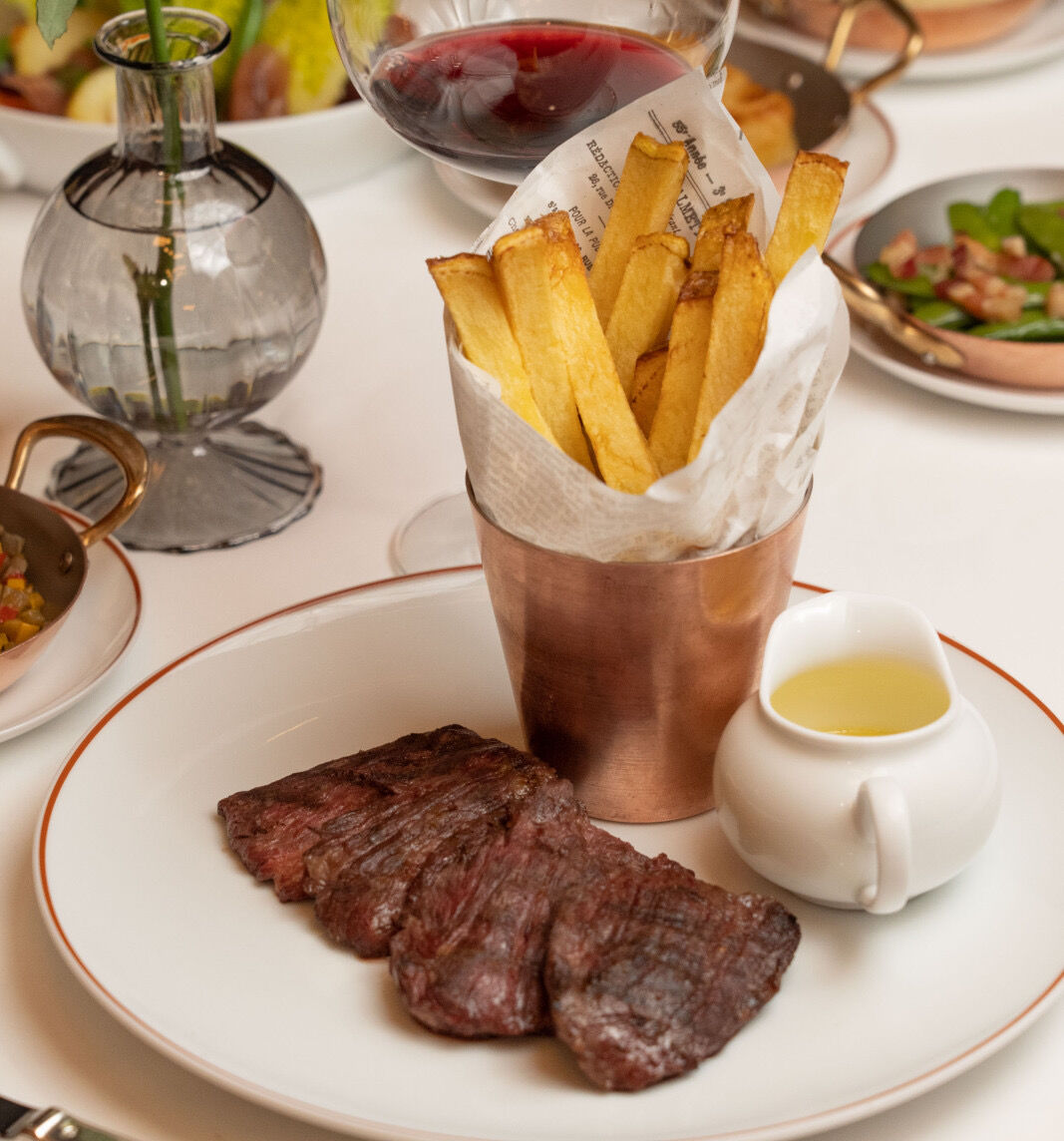
Steak frites, Aux Beaux Arts at MGM Macau
What are your recommendations or must-try dishes from the new menu?
It depends on your preferences. There is no must-try, I’d try everything! I’ve tried all of them. That question is always a little bit tricky. Some of the dishes that I’d put forward are those that are the least, say, understood. Simply because they’re the most difficult for us to create, technically. Take for example the Quennelle in Crustacean Bisque. This is a dish that you can’t find featured in any menu in town and a dish that very few people in the world are still doing because it takes a level of skill that has been lost. Not a lot of people still know how to do it. I’d put it forward as being one of my favorite dishes, although it can be a difficult dish for people here to understand. Also, I’d go with simple steak frites because I like it. Traditionally, good fries are never crispy fries because crispy fries mean frozen fries. You’d want a big chunky potato packed with flavor. I’d also go for the vol au vent too because that is a classic dish. It’s an old dish that dates back to the royal families, which was gradually made public to the bourgeoisie and now, us. I also haven’t seen anybody in Macau doing it.
Do you prepare these dishes with some kind of a twist or stay true to classic techniques?
We stay true to technique but there’s also the need to adapt to what the customer wants. Heavy sauces and heavy dishes aren’t as well-received as in the past. There is so much technique that you learn through the years coming from a Michelin background. Being able to infuse perfumes and flavors into sauces without having to use a liter of cream or a kilo of butter, that’s what takes time. We’re not changing the essence of a dish, we are evolving the dish, complementing it in a different way without making it any less interesting. At the same time, once you have that dish, it will still take you back to that memory of when you first had it or if you had it in France. That is what we’re trying to achieve with these dishes at Aux Beaux Arts–bringing back that memory with one bite of the dish, without changing them entirely. Through every culture, food is deeply connected to memory. Even now, I can taste an ingredient and I remember being a kid somewhere else and relive that exact moment. As a chef, especially having such a broad flavor “library”, my memory is punctuated by these moments in time.
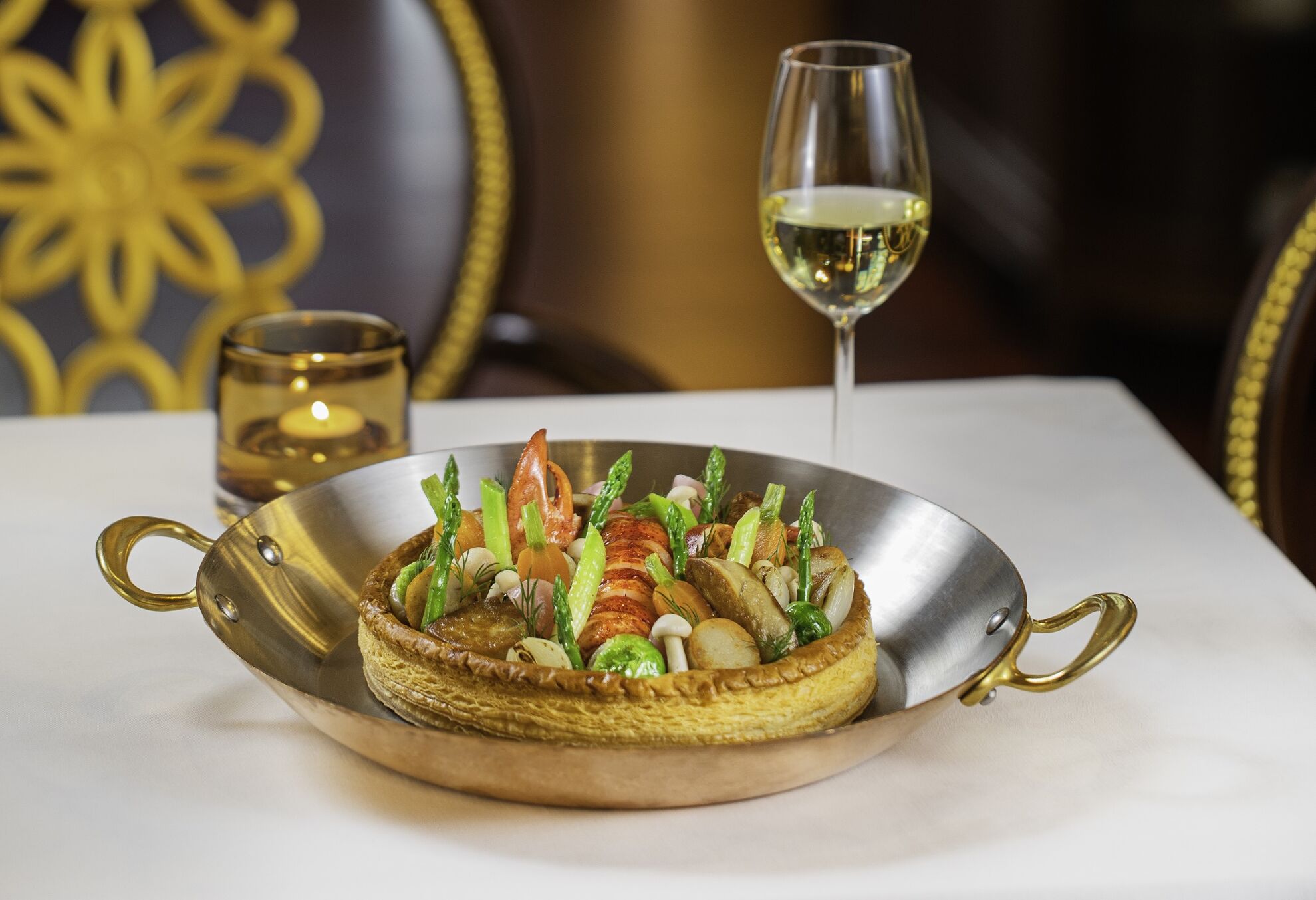
Where does your inspiration come from for creating dishes? What was the process like in refreshing the menu for Aux Beaux Arts?
The inspiration came from the roots of French food as we’ve discussed. The concept and the inspiration are dishes that are shareable, dishes that can trigger memories, not staples of French food exclusively but staples of tradition. Some of the dishes on the menu are dishes that I used to have as a kid with my family. We used to have pork trotter, it used to be placed right at the center of the table and everybody would dig in. I put the dish on the menu because I remember this and it creates emotions in me. When it is served to our guests, I hope it creates emotions for them too. If this dish managed to touch me, there’s no reason why it shouldn’t be able to do it for somebody else. The curated produce, the way it’s presented, the way it is served, and of course the sharing sentiment amongst diners make the whole experience. Asia, when it comes to sharing food, has been a tremendous experience for me. We used to share food in France but we forgot how to do it. The family values before were way stronger than they are in Europe nowadays. The focus on sharing is key, in addition to the dishes themselves. Obviously, this is a French restaurant, we’re going to serve French food. We need to have two, three, four dishes spread out on the table and everyone is able to dig in. That is the rule behind it.
In your opinion, what makes a great dish?
Great friends, the amount of care put into the dish and the amount of passion that is behind it. But if you don’t have the right people at the table, it can never be a great dish. It can be good, but it cannot be great. It comes back to the l’art de vivre a la francaise (the French art of living) and enjoying food. It’s all about the people around you. Why do we have an aperitif in France before every meal? Because a little bit of alcohol loosens everyone and suddenly people start to sit back in their chair, feeling relaxed and having a good time.
Of course, the quality of ingredients is primordial in making sure you’re creating great food. We’re lucky enough to be where we are in Asia and to be who we are as a company to be able to bring in whatever we want at the highest standards. But we also can cook French food with what we have around here, you know? It’s just a matter of perspective. Sometimes we focus a bit too much on imported ingredients. Take Macanese gastronomy for example. It’s all about using the local produce combined with techniques that have been taken around. The art of using local produce with a foreign technique is notorious. If you want to cook a sole meuniere with a sole caught in Macau, you can. Still would be called French. Plus, it would be fresh and the best you can get around instead of flying in a poor soul that is going to die somewhere in-between, kept refrigerated, and is not even necessarily French. Of course, we import also. We need to be mindful of our resources and the way we choose to do things. It’s not just because we can fly in virtually whatever we want that we need to do it. Can I fly in anything? Yes. Do I need to? Does that make sense? Not always. We need to be smart and use the right produce at the right time.
At the same time, with this philosophy, you reduce your carbon footprint and protect the environment, right?
Correct.
What’s your favorite ingredient to work with?
I don’t have one. Butter maybe, as it is used in preparing everything. But I don’t have a favorite ingredient to work with, I take pleasure with everything that I cook. I can’t have one. If I decided to have one I’d lose myself in what I do which is creating food. Was I to focus on one, the whole menu would end up looking the same.
Do you have any culinary idols?
The person who taught me to cook, my apprenticeship master, Chef Georges Paccard. He is retired now, after selling his restaurant and moving to his property in the mountains back in my hometown of Annecy I spent three and a half years with him. Those were definitely some of the hardest years in my life because I was working 16 hours a day. That environment was not for the faint-hearted. Things have changed, the whole mindset is different nowadays. However, you have to have a certain militaristic approach in the kitchen because it works that way. If it’s too much of a free flow, the synchronized ballet that needs to take place in the kitchen in order to have everything coming up on a plate at the end is at risk. So you have to have that very precise approach, it doesn’t work otherwise.
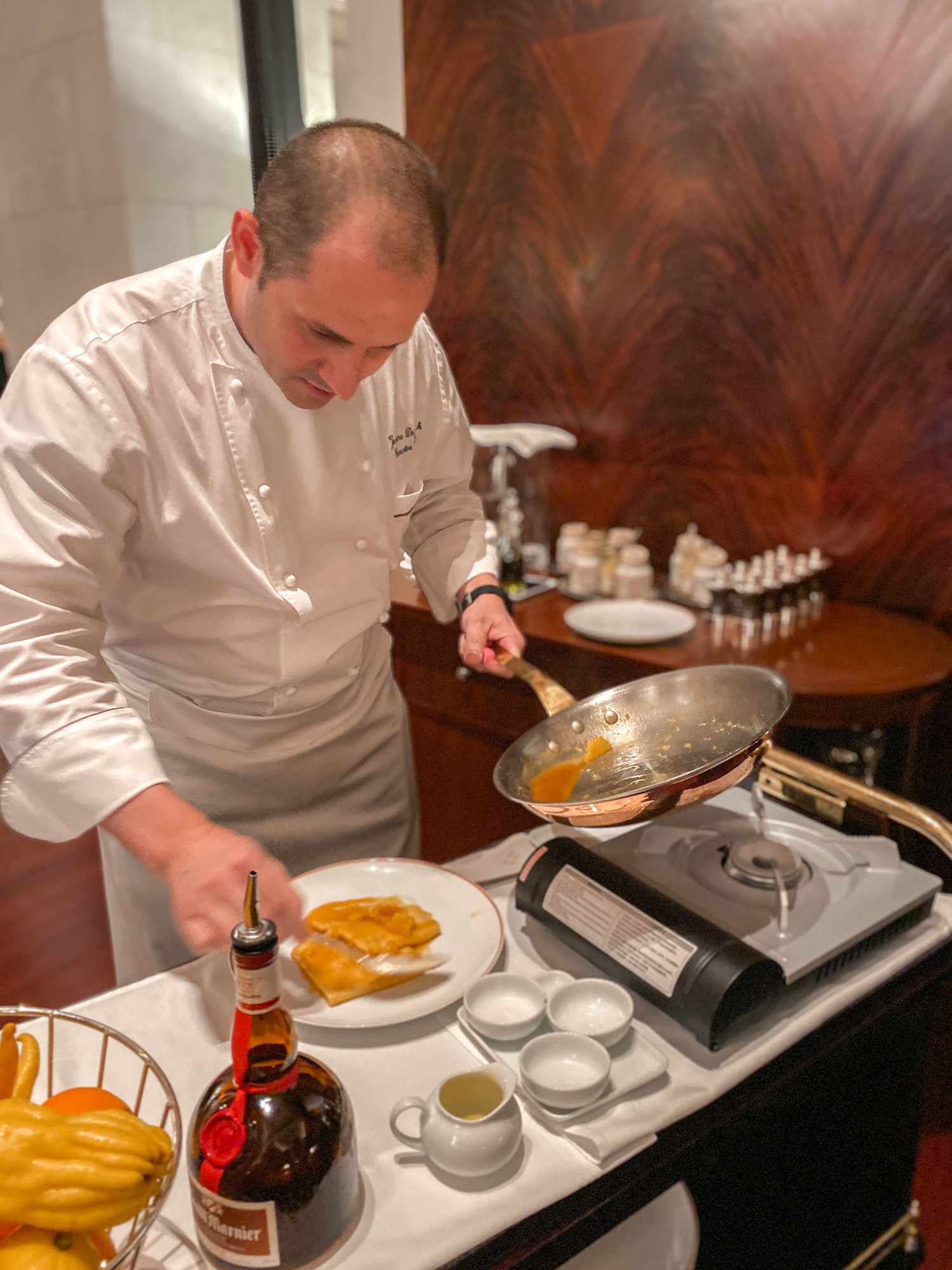
Chef Jerome Deconinck prepares Crêpes Suzette
What lessons have you learned from Chef Georges Paccard that stuck with you up to this day?
Love what you do, be precise, and don’t lie to yourself. Also, one other thing that he used to do: open the fridge every morning and check every single box in order to see if your mise-en-place is clean and fresh or whether you need to redo something. This is something I believe all chefs should be doing. Overall, if you want to maintain high quality, you have to actually be there, be present. Chef Paccard would arrive every morning and go through everybody’s station and fridge, he would go through the whole kitchen. If it wasn’t the exact way he wanted it to be, well let’s say that would be a hell of a morning! (laughs). Rigor makes the difference.
During my apprenticeship, I was lucky enough to be selected to take part in the “Best Apprentice in France” contest and that required training. At the time we had only one and a half-day off. Chef Paccard and I would meet on our day off and spend the day working in the kitchen together so that I could train. We didn’t have the time to do it during operation hours so it had to be either on our day or late at night after a 16-hour shift. He would open up the kitchen just for me and we would do a dish again and again until I got it right, he took that time. This is something that has been lost and is something that makes a difference at Aux Beaux Arts too. I’m not solely telling my team how I’d like the food to be, I’m going beyond and showing them how I want it to be and explaining to them why. Once they understand, then we move to another dish. If you don’t teach, don’t expect people to understand. Be present, be there for them.
Do you have any advice for aspiring chefs?
Don’t do it! (laughs) Don’t do it if you don’t love it. You need to be crazy to do this job. Picture yourself in a position in which you miss the birthday of your wife and kids, Christmas, you’re always working while everybody else is on holiday. You need to be in love with your job more than anything else. You can’t be a chef if you’re not in love with the profession because at some point something’s got to give. Either you won’t be a chef anymore or the people around you won’t stick around. We spend more time devoted to making other people happy than pursuing our own happiness. I can’t be happy if our customers aren’t happy. I’m extremely stressed if something doesn’t go well during prep. This is my life.
Some people don’t understand what it takes to be in the kitchen. You see so many kids going to culinary schools and some of these schools sell the business as being glamorous, catering for celebrities and all of that. When I was doing lectures for new kids that wanted to become chefs back in Malaysia I’d warn them that this business is everything but glamorous. Eventually, one out of thousands of these kids becomes successful and makes a living out of it. Having the militaristic approach actually helps to quickly weed out those who really want this from those who don’t. This is not a job for the lazy, that’s for sure. At the beginning of my career, I was working 16 hours a day. Today, if I work just for 10 hours a day it feels like I haven’t done anything, seems like I worked for half a day only. So to an aspiring chef: don’t do it unless you’re ready to commit and love it with your core. If you are tough, the sky’s the limit.
When you’re not working, how do you spend your free time in Macau?
I try to spend as much time as possible with my wife because we don’t get many chances to do so. We enjoy dining out and watching a good movie. I like to stroll around Taipa Village, go on a seaside walk. I like to hike the trail that leads from the strip to One Oasis, then all the way to Hac Sa Beach.
Do you have any favorite places to eat out in Macau? Where do you go for a meal on your day off or when you have friends in town?
I’m a simple person. One of the places I like is Nga Tim. We always have the same thing over there, tiny fried fish that instantly disappear in the mouth and clams. I love the setting, the no-frills ambiance. I love dim sum too. The dim sum at Chun is great. The whole dim sum experience on a Sunday morning with my wife is one I find very enjoyable. I actually dine at MGM a lot. I come to Aux Beaux Arts as a customer with my wife because I know the food is good. I like to go to Grill 58 for a good steak and Five Foot Road for the spicy Sichuan food.
2020 was an interesting year for everyone. What lessons did it teach you?
Resilience and patience. Macau is a very nice place to live in when you are able to leave from time to time and then come back and appreciate what you have here. But staying without being able to go out is definitely challenging. However, these are times to be appreciative of all that we have, like having a job and being able to have my wife here with me. I can’t imagine if my wife had been in Thailand by the time the borders were shut and we had to stay apart. I don’t know what I would have done, it’s impossible to fathom. So I’m just thankful.
Taste the French art of living and Chef Jerome Deconinck’s creations at Aux Beaux Arts
Aux Beaux Arts MGM Macau, Avenida Dr. Sun Yat Sen, Macau, +853 8802 2319, www.mgm.mo

